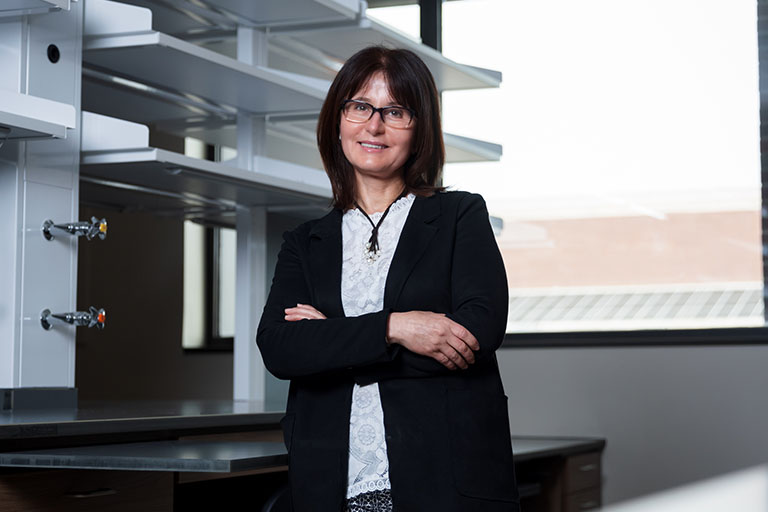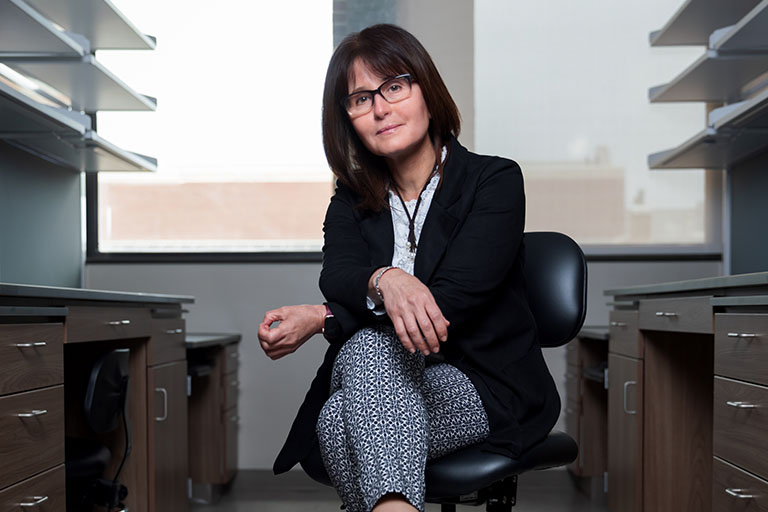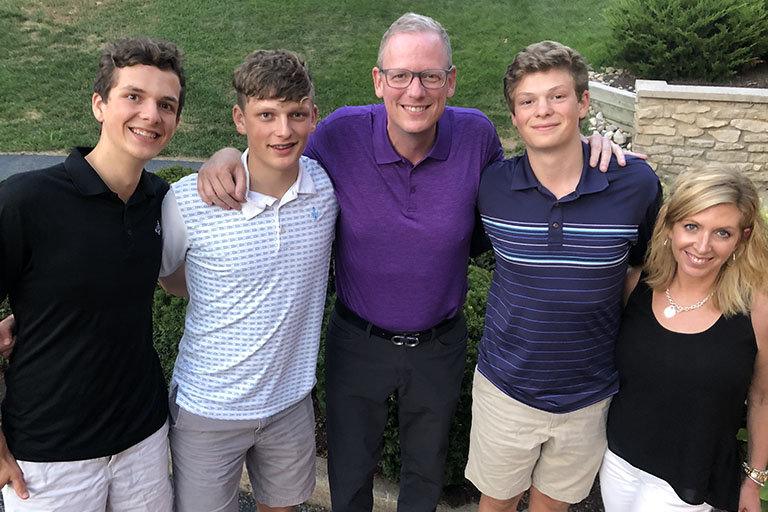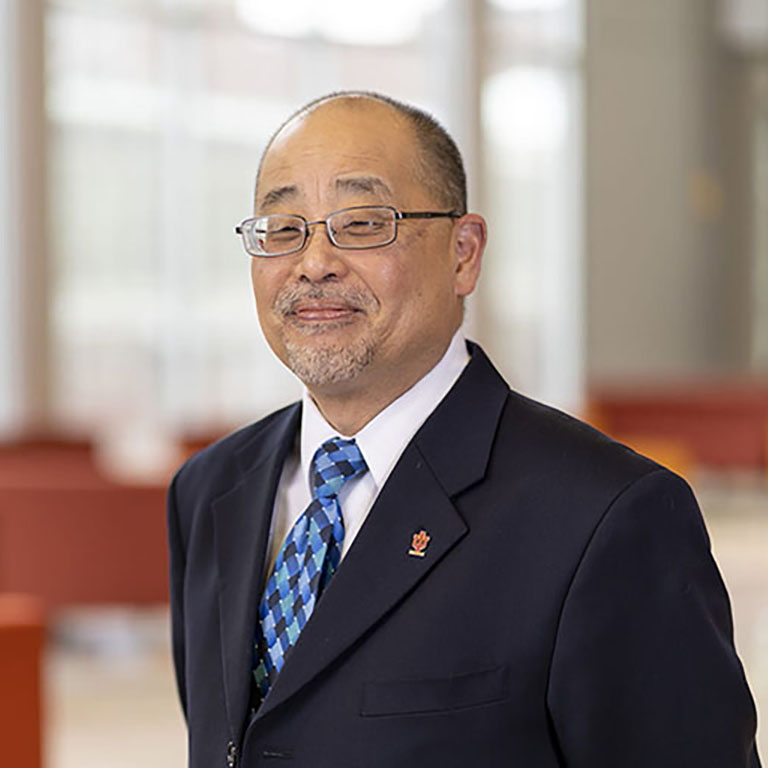Building Blocks of Discovery
INDIANA ELKS and IU SCHOOL OF MEDICINE
INDIANA ELKS and IU SCHOOL OF MEDICINE

REPORT TO THE INDIANA ELKS 2022
Immunotherapy holds tantalizing promise for treating all forms of cancer. Now, Huda Salman is trying to harness it at IU School of Medicine. It starts with getting a clinical trial off the ground.
Using gloved hands, Christina Vaughn gently squeezed a pipette trigger, slowly dribbling a clear chemical solution into a flask, which she immediately placed into an incubator and warmed to 98.6 degrees.
To the naked eye, it’s just routine lab work. But, at a microscopic level, something phenomenal was about to happen—a rapidly accelerating process that would grow to millions of trained cancer killers—CAR T cells.
In little more than a week, Vaughn, a lab tech in IU School of Medicine’s new Cell and Gene Therapy Manufacturing Facility, grew 300 million CAR T cells. And this was only a practice run.
Until now, Vaughn has been limited to producing just a few million cells over similar periods—or thawing out bags of cells shipped from manufacturing sites elsewhere around the country.
But the days of shipping and small-scale production are almost over. The School of Medicine—more specifically, the Brown Center for Immunotherapy—is about to begin making mass quantities of CAR T cells on a routine basis.
Five years after its creation, the Brown Center is poised to make IU a player in the revolutionary effort to greatly enhance the immune system’s ability to fight debilitating diseases like cancer.
The center’s first director, Huda Salman, MD, PhD, MA, is still courting top talent, fleshing out research priorities, and launching innovative clinical trials. It will take time and money. But Salman brought with her a Phase I trial that will allow IU to put its top-tier facility to good use. She also brough a clear vision.
“This is about building an immunotherapy program that doesn’t just involve one discipline,” she said, “but all tumors.”
For the moment, Salman and her assistant are the sole tenants in the Brown Center. Its labs are pristine—and dark—as they await occupants. It’s a daily reminder of the job ahead.
Salman came to IU from Stony Brook University in New York. Initially, she was vetted as a potential director of hematology and oncology. Salman was already doing exciting work with CAR T cells, having secured a $3.1 million federal grant. And she was doing it at a relatively small medical school with limited facilities.
“The impression was that she is somebody who gets stuff done,” said Kelvin Lee, MD, director of the IU Melvin and Bren Simon Comprehensive Cancer Center.
Salman’s initial research, at the Medical College of Georgia, focused on finding and explaining genes that drive cancer—and can become targets for traditional drugs. At Stony Brook, Salman’s colleagues were focused on CAR T cells—which refit immune cells to seek out and attack tumor cells. Seeing that her expertise overlapped with their work, she pivoted.
T cells are a staple of our immune system, fighting off infections. In CAR T production, T cells are extracted from a patient and sent to a lab for reengineering—so that they recognize a cancer. Once these cells are tweaked, millions of them are grown and infused back into the patient—a roving cancer patrol.
The approach is revolutionary and relatively fast. A drug company might spend 15 years developing a cancer drug. Salman and her colleagues at Stony Brook cranked out six of these antigen receptors in two years. “Immunotherapy is something that can be fruitful and productive so much faster,” Salman said.

After one of their receptors showed promise, Salman joined her colleagues at a small start-up called iCell Gene Therapeutics that would tackle a rare group of cancers with a survival rate of only 40 percent.
By 2017, early data showed those modified cells worked on cell lines in the lab and in animal models. The FDA approved a clinical trial the next year.
Salman helped recruit patients at Stony Brook, where their blood samples were collected, and their T cells processed. Those cells were shipped to an off-site manufacturer that inserted iCell’s receptor. Finally, those modified CAR T cells were frozen, shipped to New York, thawed, and infused into patients.
One of the patients Salman recruited for the trial was a 19-year-old who had undergone high-intensity chemotherapy and a failed bone-marrow transplant. His family was aggravated and exhausted but became convinced the trial was their sole option. Six weeks later, the teen’s lymphoma was in remission—without side effects.
It was around then IU reached out to gauge Salman’s interest in applying for the Brown Center director role. She hesitated. But the more Salman weighed the opportunity, the more sense it made.
At IU, the Brown Center could recruit patients from across Indiana. It had its own CAR T manufacturing facility. And the longer Salman looked, the more collaborators she saw. “They had this huge intention to make this program successful,” she said. “Everything here is a good equation for success.”
Lee, the cancer center director, is confident Salman can place the Brown Center and the School of Medicine at the “bleeding edge” of cancer treatment. And it will happen soon. By year’s end, up to 10 patients with lymphoma will receive CAR T cells manufactured in Indianapolis.
That will be a milestone. Yet the real promise—and thorny challenge—of CAR T and immunotherapy rests in treating solid tumors, such as triple-negative breast cancer.
The problem is precise targeting. How do you focus a horde of cancer ninja cells so they wage battle only against tumors, while sparing healthy tissue?
Lee sees thymoma as a starting point. Just below the breastbone, the thymus is where T cells grow and mature. The gland increases in size until puberty before shrinking and turning to fat. “It’s dispensable,” Lee said. And because it educates T cells for specific functions, CAR T cells sent there won’t go rogue.
While thymoma is rare, affecting just 500 people in the U.S. annually, it’s tough to treat. Developing effective immunotherapy would do more than expand options for patients.
Reaching lofty goals for difficult cancers requires targets—and researchers to discover them. Philanthropy has provided Salman with funding to bring more talented scientists to Indiana. But there’s competition from other schools and start-ups awash in capital. “You have to convince them that they get the opportunity to build something really cool,” Lee said.
Once Salman has the people in place, she envisions the Brown Center turning cancer research upside down. Most therapies focus on a single type of cancer, but immunotherapy is “disease agnostic”—a single target might be the solution for multiple cancers.
Viki Graves is eager to get started.
She oversaw the transformation of a roughed-out space on the third floor of University Hospital into a facility that could make a living drug. Today, it is modest in size, but on par with regional peers. At capacity, the facility could make CAR T cells for 70 patients each year.
Now that Salman is here, her clinical trial stands out as a watershed moment. “It’s going to be the first cellular product we’ve been able to manufacture all the way through,” said Emily Hopewell, PhD, director of the Cell and Gene Therapy Manufacturing Facility.
IU still needs FDA approval. It must show that its Indianapolis facility can read and carry out the same 90-page recipe used at a facility at the University of Louisville.
Helping advance the timetable, though, is that every step of the process—cell collection, receptor creation and manufacturing, and patient care—can unfold at IU. At the current pace, Hopewell said, IU could be preparing CAR T cells for patients by late summer or early fall.
The Indiana Elks have been steadfast in their support of cancer research at Indiana University. Your philanthropic funding provides building blocks for early-stage research, allowing IU researchers to apply for additional external funding for their continued research. Thank you for providing a solid foundation for experts like Dr. Salman who are working to revolutionize cancer research and care.

Matt King, a patient, advocate, and supporter of the IU Simon Comprehensive Cancer Center, is grateful to donors like the Indiana Elks who make life-saving cancer research possible.
“The recent advancements in cancer research saved my life, without question. I was diagnosed with Stage IV melanoma and given six months to live. Within a year of undergoing treatment with a revolutionary immunotherapy drug called Keytruda, I was cancer-free. Without funding, researchers are limited in their options to explore all their ideas to defeat cancer. I am a great example of how research funding saves lives, and I am grateful to everyone who has given to cancer research.”

Dear Friends,
This year, we celebrate the cancer center’s 30th anniversary. Incredibly, the Indiana Elks have been IU’s partners in supporting cancer research for longer than the center itself has existed. Suffice it to say, you have been foundational partners in our success.
I am delighted that our annual report to you this year features Dr. Huda Salman, the first executive director of the Brown Center for Immunotherapy. She boasts an impressive research track record and unique personal history. A leukemia survivor herself, Dr. Salman’s clinical focus is on blood cancers, bone marrow transplantation and cellular therapy.
Support provided by the Indiana Elks to fund cancer research at Indiana University is imperative to the recruitment, retention, and success of brilliant minds like Dr. Salman. The cancer center would not be where it is today without the philanthropic support and advocacy afforded to us from all of you. Thank you.
Sincerely,
Kelvin Lee, M.D.
Director, Indiana University Melvin and Bren Simon Comprehensive Cancer Center